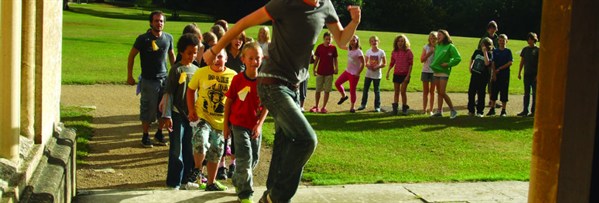Children find happiness at summer camps
31 May 2012 | Chris Green

"Thank you for the happiest 118 days of my childhood" wrote a
hospital nurse in her forties recently remembering the two summer
camps or so a year she attended between the ages of nine and
sixteen. Her comment is typical of hundreds made by adults like her
looking back, or equally by children, their parents, or young
leaders when they have just experienced a summer camp.
"I don't think I have ever seen so many happy, happy people in
one place enjoying each other's company before" said a 20 year-old
leader when she got home a couple of years ago. A parent attending
a performance at a recent drama camp said "The spontaneous singing
at the end is a treasured memory which will stay with me forever.
The sight of so many young people enjoying themselves brought tears
to my eyes. For my daughter to be so uninhibited and just enjoying
the moment without concern was amazing."
A summer camp brings together 30 to 70 young people aged 9 to 15
from all parts of Britain, all kinds of schools, and all social
backgrounds, to spend a week or ten days in a country mansion or
adventure centre (often a boarding school hired for the holidays),
away from the world of TV, computers and commercial pressures. They
will never have met their fellow campers, or often anyone like
them. This disparate group of youngsters grows quickly into a group
of friends, and by the end of the camp it has become a family like
community of people who really enjoy each other's company. The
programme of activities, which can range over games of all kinds,
exploring, arts and crafts, singing, tracking games, swimming,
outdoor activities of all kinds, acting and singing, stories round
the fire at night, and the odd day out, acts as a kind of group
dynamic to get everyone talking and working together in a very
short time.
Summer camps are staffed largely by 18 to 25 year-olds, often
students, mostly volunteers, each of whom looks after a group of 8
or 10 youngsters within the camp. There are also more experienced
people working as directors in overall charge, also assistant
directors, caterers and matrons. All staff have been carefully
trained for their particular role, and usually they enjoy the
experience every bit as much as the children. It adds significantly
to the children's sense of security and their enjoyment to have an
older brother / older sister figure devoting all his or her time to
looking after their welfare and organising their activities.
Anyone wanting to find ways of making our society and in
particular our children happier would be well advised to come and
take a look at summer camps. They will see young people living
together in a kind of bubble away from many aspects of their life
outside, and having a truly happy experience. However, when they
ask just why and how this situation brings so much fun and
enjoyment, there will probably be a reflective silence followed by
a wide variety of answers. The absence of TV and computers
gives no alternative but to talk and relate to each other. The
enthusiasm of the young staff rubs off on the
children. Youngsters are excited to find they can get on with
others not like them who they had not met a few days earlier. Doing
things together in a green and peaceful setting is a new experience
of fun. The camp allows them to live some "real childhood" and
enjoy playing in the fields, flying kites, looking for clues in the
woods or relaxing round a camp fire, opportunities they do not get
in the modern world as much as they should. The camp keeps children
safe both physically and emotionally.
The Campaign for
Summer Camps exists to push for many more British children to
experience summer camps. A major PR campaign to change hearts and
minds will have to be involved, since the possibility of going to
camp is not something most children or parents consider (less than
2% of our child population ever experience any kind of summer camp,
as against 70% in the USA and 40% in France.) If we could get to a
situation where going to summer camp became a part of most
children's lives, and the infrastructure and staff training was in
place to support this, it would have a massive impact for the
better on many aspects of our national life. Above all it would
create a lot of happiness for a lot of people.
Teachers regularly comment on the more positive attitudes shown
by pupils who have been to summer camp. An appreciative parent once
wrote to say "when our children come back from camp they have a
kind of glow." Youngsters have had a lovely time, they know they
have made a worthwhile contribution to a happy community, they have
made new friends and discovered new things they can do. They feel
the peace and joy that comes from having been part of something
good. If, as is probably true, there are many different kinds of
happiness, I feel sure that those children's "kind of glow" must be
among the very best of them. To strive to offer it to many more
young people must be an endeavour worth persistence and hard
work.

About the author
Chris Green MBE runs the Campaign for Summer Camps. He
is a retired teacher and has been involved in summer
camps for over 30 years. He believes passionately that summer
camps can be a truly life-changing positive experience for
youngsters from both well-off and disadvantaged families. He
was awarded the MBE in 2011 for services to education through
summer camps.
Tags:
Connect with people, Live life mindfully, Keep learning new things, Be part of something bigger